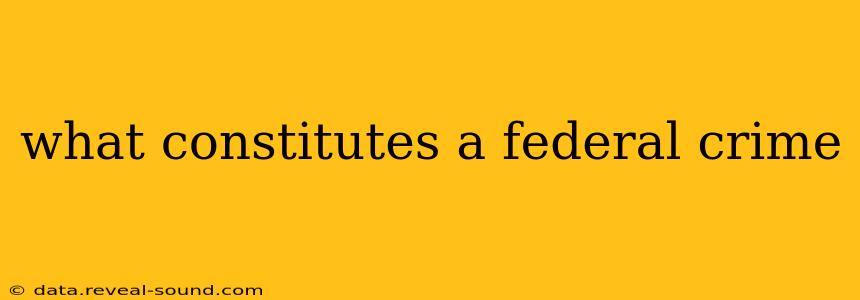What Constitutes a Federal Crime? Understanding the Reach of Federal Law
Federal crimes are offenses against the laws of the United States, as opposed to state or local laws. They are investigated and prosecuted by federal agencies, such as the FBI, DEA, and ATF, and tried in federal courts. Unlike state crimes, which vary widely across different states, federal crimes are defined by federal statutes passed by Congress. This means there's a consistent set of laws applied nationwide, though the application and enforcement can vary depending on agency priorities and resource allocation.
Understanding what constitutes a federal crime requires looking at the types of actions and activities covered by federal law. These are generally crimes that:
-
Affect interstate commerce: A significant portion of federal crimes involve activities that cross state lines or affect interstate commerce. This broad definition allows the federal government to prosecute crimes that might otherwise fall under state jurisdiction if they have a substantial impact on the national economy. Examples include bank robbery (even a small local bank is often involved in interstate banking systems), certain types of fraud schemes (like those involving internet sales across state lines), and transportation of illegal goods across state lines.
-
Involve federal property or employees: Crimes committed on federal land (national parks, military bases, federal buildings), against federal employees, or involving federal property, are generally considered federal crimes. This includes assault on a federal officer, theft of government property, or sabotage of federal facilities.
-
Violate federal regulations: Many federal agencies have specific regulatory powers, and violations of those regulations can lead to federal criminal charges. This applies to areas like environmental protection (EPA regulations), financial regulations (SEC regulations), and food safety (FDA regulations).
-
Are explicitly defined as federal crimes: Some offenses are specifically designated as federal crimes by statute, regardless of their connection to interstate commerce or federal property. These include crimes like treason, espionage, counterfeiting, and certain types of drug offenses.
What are some examples of Federal Crimes?
To illustrate, here are some common examples:
-
Drug trafficking: The distribution, manufacturing, and possession of certain controlled substances are significant federal crimes, particularly those involving large-scale operations or interstate trafficking.
-
Bank robbery: Even a small-scale bank robbery can be a federal crime due to its connection to interstate banking systems.
-
Tax evasion: Failure to properly report income or pay taxes can lead to serious federal criminal charges.
-
Fraud (various forms): Wire fraud, mail fraud, securities fraud, and health care fraud are all examples of federal crimes that often involve complex schemes to defraud individuals or organizations.
-
Cybercrime: Crimes involving hacking, identity theft, and data breaches frequently fall under federal jurisdiction.
How are Federal Crimes investigated and prosecuted?
Federal investigations are typically conducted by specialized federal agencies, often with the cooperation of state and local law enforcement. Once an investigation is complete, the case may be presented to a federal grand jury, which decides whether or not to indict (formally charge) the defendant. If indicted, the case proceeds to trial in a federal court. Sentences for federal crimes can be significantly longer than for comparable state crimes.
What are the penalties for federal crimes?
Penalties for federal crimes vary widely depending on the specific offense and the defendant’s criminal history. They can include:
- Imprisonment: Sentences can range from a few months to life imprisonment, depending on the severity of the crime.
- Fines: Significant financial penalties are often imposed.
- Probation: This involves supervision within the community, usually with conditions attached.
- Restitution: The court may order the defendant to compensate victims for their losses.
What is the difference between state and federal crimes?
The key difference lies in the jurisdiction. State crimes are offenses against state law, prosecuted in state courts, and typically involve crimes committed entirely within a state's borders. Federal crimes, as discussed, are offenses against federal law and involve a broader range of activities, often crossing state lines or impacting national interests. Some actions can even be prosecuted under both state and federal law, leading to separate prosecutions in different court systems.
This information is for educational purposes only and should not be considered legal advice. If you have questions about a specific situation, you should consult with a qualified legal professional.
